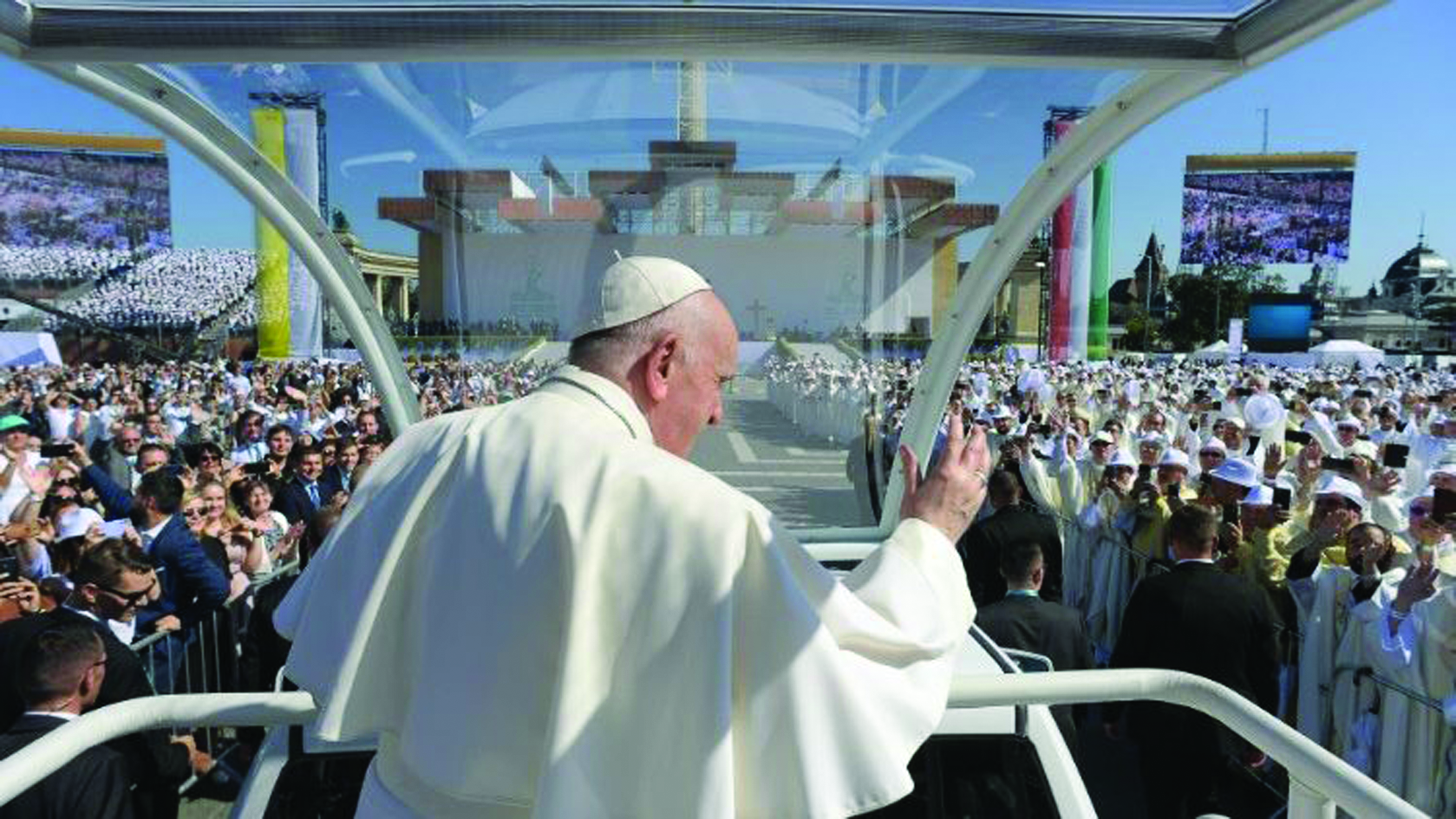
Archbishop Sviatoslav Shevchuk of Kiev-Halych, leader of the Ukrainian Greek Catholic Church, gives the homily during a Divine Liturgy for Ukrainian expatriates at the Basilica of St.Mary Major in Rome February 19.
Pope Francis has been trying with all his strength to help make peace possible in Ukraine. But in Ukraine, war is intensifying.
Pope Francis on February 20 met with Ukraine’s Catholic bishops and urged them to focus on the social and human tragedies unfolding in their country and to avoid politicizing their role as Church leaders. He asked bishops from Ukraine’s Eastern- and Latin-rite traditions to work together and be a clear moral voice calling for peace and harmony as well as strong defenders of families, the poor and weak.
“The sense of justice and truth is moral before being political, and such a task is entrusted to your duties as pastors, too,” he said in a written address.
The bishops from Ukraine’s Byzantine- and Latin-rite communities were in Rome February 16-21 for their ad limina visits to report on the state of their dioceses.
The Vatican said the Pope had his two-page written speech handed out to the bishops rather than read aloud.
“I have assured you on many occasions directly and through cardinal envoys, I am particularly close to you with my prayer for the deceased and for all those affected by the violence, with prayer to the Lord that he may soon grant peace,” he said.
He said he continues to appeal to “all sides concerned” to respect international law and carry out their agreements, especially a recent cease-fire deal.
However, he said Ukraine’s bishops must avoid becoming politicized, saying, “You are not called to give a direct response” to those historical issues and current concerns that have, “in part, a political basis.”
As citizens of Ukraine, the bishops have the right, as individuals and as a group, to express their thoughts about their future, he said. But “not in the sense of promoting a concrete political action, rather in the indication and reaffirmation of the values that make up the thing that holds Ukrainian society together, persevering in the tireless search for harmony and the common good,” he said.“The Holy See is at your side, also at that of international entities, to make your rights, your concerns and the just evangelical values that motivate you, understood,” he said.
“Personally it hurts me to hear that there are misunderstandings and wounds” between the different Christian rites and traditions in Ukraine, he wrote. “There needs to be a doctor, and it is Jesus Christ, whom you both serve with generosity and all your heart.”
These words echoed a “heartbroken appeal” for prayer and dialogue to resolve the crisis in the Ukraine that Francis made at his general audience on February 4.
“Once again my thought goes to the beloved Ukrainian people,” he said then. “Unfortunately, the situation is worsening and the opposition between the sides is getting graver….
“We pray to the Lord that this horrible fratricidal violence will end as soon as possible.
“I renew my heartbroken appeal that every effort be made — also at the international level — for the resumption of dialogue, the only possible way to bring about peace and concord in that martyred land.”
He added: “Brothers and sisters, when I hear the words ‘victory’ or ‘defeat,’ I feel a great pain, a great sadness in my heart. They are not the right words. The only right word is peace! This is the only right word! I think of you, brothers and sisters of Ukraine. But think about this, this is a war among Christians! You have your Baptism, you are fighting among Christians! Thinks about this, this scandal!”
Before the bishops’ meeting with the Pope, the head of the Ukrainian Catholic Church said the Ukrainian Catholic bishops intended to share “the truth” with Pope Francis about the ongoing crisis in their country: that it is not a civil war but “the direct aggression of our neighbor.”
But some in Ukraine were upset by the Pope’s words. Critics said his choice of words suggested that the Holy See views the crisis in eastern Ukraine as a civil war. They accused the Holy See of using rhetoric in line with the Russian position on the conflict for the sake of keeping positive ecumenical relations with the Orthodox Church.
Noting “the differing interpretations of the Pope’s words,” the Vatican press office issued a statement February 10, stating that the Pope is “following attentively” the situation in Ukraine and has always addressed “all interested parties” when speaking about the conflict.
Then, Archbishop Sviatoslav Shevchuk, major archbishop of Kiev-Halych, said February 19 that he and his fellow bishops were in Rome “to convey the truth to the Holy Father about the situation of Ukraine… And the truth is that we, the Ukrainian people, are the victims. We do not have a civil war in Ukraine. We have an aggression of a foreign country against the Ukrainian citizens and the Ukrainian state.”
And, after a St. Mary Major liturgy February 19 to pray for peace in Ukraine, Shevchuk told journalists that the situation in his country could be described “in one word: a war. We are witnessing the biggest humanitarian catastrophe in Eastern Europe since the end of the Second World War.”
Hundreds of Ukrainian nationals, living in Rome, packed St. Mary Major for the February 19 liturgy to pray for Ukraine, with dozens lining the aisles or sitting on the steps of the side chapels. Cardinal Leonardo Sandri, Prefect of the Congregation for Eastern Churches, was also in attendance.






Facebook Comments